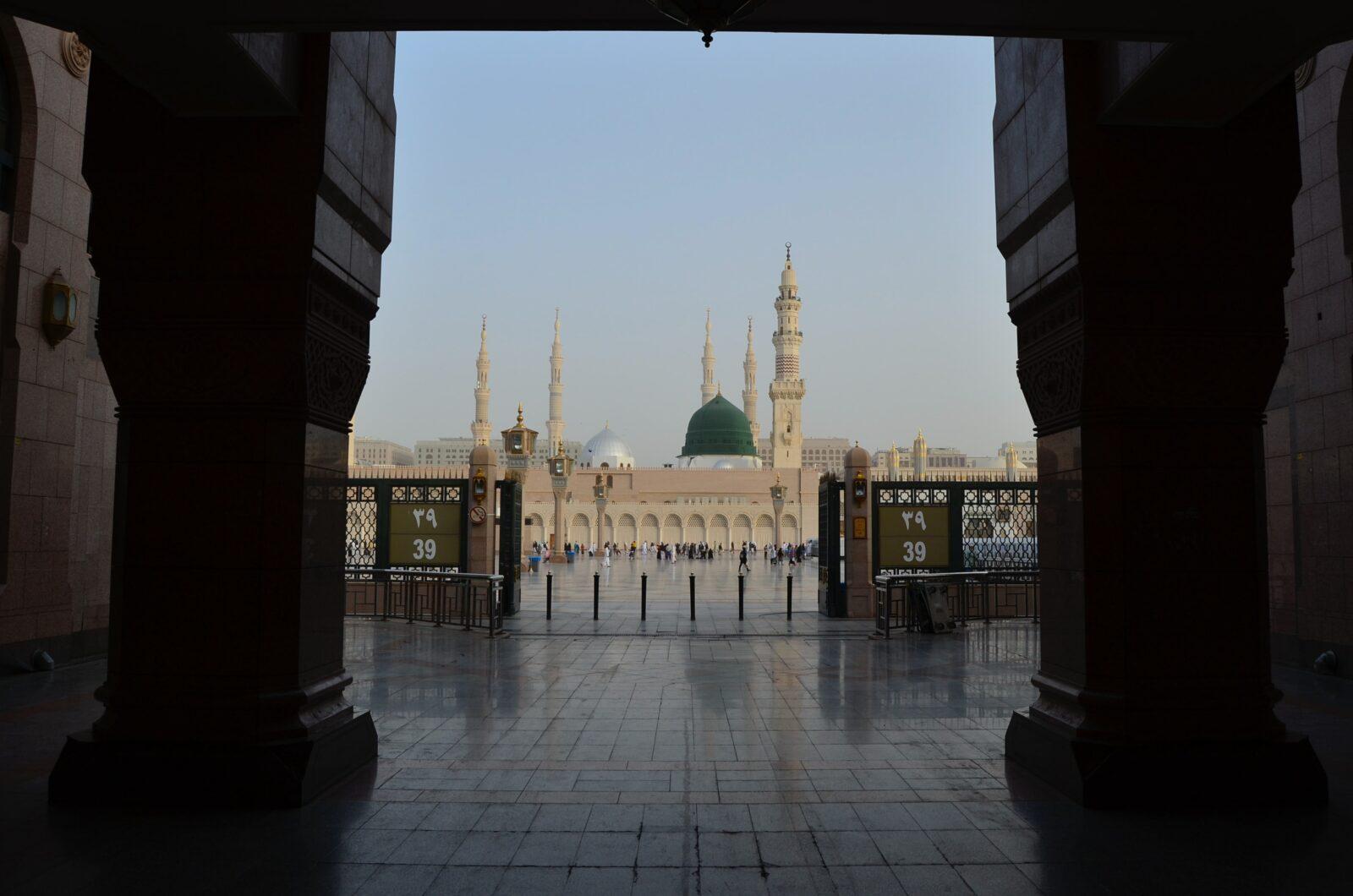A few years back, I read an article about the Prophet (ﷺ) and his mission on the editorial page of a leading newspaper, written by a prominent Islamophobic “intellectual”. The article made no pretense of scholarship, it was simply a regurgitation of the vilest slanders against the Prophet (ﷺ), which had been given pride of place on the edit page.
I was shocked and deeply saddened to read it. Hoping to write a rebuttal, but not having all the facts at hand, I wrote to one of my teachers – a renowned scholar on the Hadeeth, Seerah and its sciences — seeking his help. As I sat at the computer, typing all those vile accusations directed to the Prophet (ﷺ) to give my teacher an idea of what I was dealing with, I cried and cried and cried.
How did he, whose very name means “One worthy of Praise” become the recipient of such slander? How did he, upon whom Allah and his angels send salutations, become the recipient of blame? All day long I hovered around the computer, restless. Checking and re-checking my e-mail account to see if my teacher had replied.
When he did reply, I cried again. This time with relief at the perspective that he had provided. He simply said: When the Companions of the Prophet (ﷺ) used to be in battle, they would be unsure about the outcome, since all knowledge about the results of our efforts rests with Allah. They would be unsure… until their enemies would start vilifying the Prophet. Whereupon they would be assured that they will gain victory over them, if not in this battle, then in the next. Because Allah Himself is the defender of the Prophet’s honour. He , azza wa jall, has said: inna shaaniaka huwal abtar …For he who hates you , he will be cut off (from posterity and every good thing in this world and the Hereafter) [Qur’an108:3]
Attempts to sully the blessed name of the Prophet (ﷺ) are nothing new. The Qur’an itself addresses and authoritatively refutes many of them.
The Prophet (ﷺ) was mercilessly mocked and accused of being everything – from a magician and soothsayer to a man possessed or a man who had lost his senses — by those opposed to his Divine Message. The Makkans offered him unimaginable wealth, marriage to the most beautiful of their maidens and even kingship over all of Arabia if the Prophet (ﷺ) agreed to give up his mission…or at least agreed to include their revered goddesses as intermediaries to Allah. At the height of their “generosity” – they offered help in seeking the best medical treatment that would “cure” him (ﷺ) of his visions. When the Prophet (ﷺ) refused to compromise on his Divine Mission, they resorted to the last refuge of the spiritually, morally and intellectually bankrupt: slander.
The Makkans launched an unscrupulous propaganda war that can only be paralleled by the one we are witnessing today. When the Prophet (ﷺ) approached people who came from different parts of Arabia to the pilgrimage at Makkah and the neighbouring markets of ‘Ukaaz. Majannah and Dhu al Majaaz with his message, a lot of them were receptive.
Realizing the danger of this and threatened by the loss of their trade if people converted to monotheism and forsook the cult of the goddesses, the Makkans concocted the charge of “magical eloquence”. One Makkan nobleman, al Waleed al Mugheerah suggested that they should spread the word that Muhammad (ﷺ)was a magician whose craft was an eloquence so effective, that it could turn a man against his family, against his tribe, against his beloved gods within minutes.
So successful was this allegation, that some of the pilgrims actually stuffed their ears with cotton or cloth while in the precincts of Makkah or created an unholy racket when the Qur’an was being recited, so that the words of Muhammad (ﷺ) may not even accidentally enter their ears. One such person was al Tufayl ibn Amr al Dawsi, a poet belonging to the Daws tribe. He was approached by the Quraysh and “warned” about the danger on the first day he came to Makkah. He walked about Makkah with his ears closed shut with his fingers and went to great lengths to avoid Muhammad (ﷺ) and his message.
Until one day he came upon the Prophet (ﷺ) sitting in the shade of the Ka’bah and preaching there. In his own words: “I thought, “Woe to me! Am I the intelligent poet, the mature man to fear that I may not distinguish between the genuinely beautiful and the really ugly in human discourse? Shouldn’t I go to Muhammad , hear all that he has to say and apply my own judgement? If I should find it good, why shouldn’t I accept it? And if I find it evil, surely I shall avoid it.” He followed the Prophet (ﷺ) to his house, heard his message, converted to Islam and went back to his tribe to preach Islam.
He is not the only example of the persuasive power of the Prophet’s (ﷺ) message. A “fact-finding” group of 20 Christians arrived in Makkah , sent by members of their own community to find out more about this new faith. They sat with the Prophet (ﷺ) and asked him all kinds of questions, which he replied to their satisfaction. They too declared their conversion to Islam, earning the wrath of the Makkans, who castigated them thus: “Wretched fact-finding mission you are! Your fellow religionists sent you here to investigate the man and bring them the factual news concerning him. But you have hardly sat down with him before you apostatized from your own religion and believed in everything that he said!”
Frustrated, the Makkans resorted to another trick. They had their most accomplished and vituperative orators, among them an Nadr ibn an Harith and Amr bin Hisham (aka Abu Jahl) follow the Prophet (ﷺ) wherever he went. As soon as the Prophet (ﷺ) finished calling men to the worship of Allah alone, warning them of the Day of Judgement, talking of bygone civilizations and the punishment they faced, the Makkan orator would start his speech.
He would tell the assembly about Persia and its religion., tales of love and passion, flowery myths…anything to distract the company from the compelling message of Islamic monotheism. He would conclude by asking the assembly, “Why is his speech better than mine? Does he not draw from the tales of antiquity just as I do?” Makkans would memorize these speeches and circulate them wherever they had a chance as counter-measures to the Prophet’s (ﷺ) words.
Can blatant falsehood ever be a counter-measure to Truth? It has as much chance as darkness has as a counter measure to Light. Our Creator has taken it upon Himself to perfect the light of the Truth that He sent His Prophet (ﷺ) with: Abu Hurayrah [RA] narrated that the Prophet (ﷺ) said: “Do you wonder at how Allah diverts me from the abuses of the Qur’aysh? They abuse Mudhammam [an antonym of the word Muhammad , which means Blameworthy] , while I am Muhammad (ﷺ) (Sahih Al-Bukhari)
When Orientalists like Washington Irving, Dante Alighieri and in more recent times Salman Rushdie heap ridicule and abuse upon fictitious characters named Mahomet and Mahound….we can see living proof that Allah is the Protector of His Prophet (ﷺ). The Prophet (ﷺ)was given the name “Muhammad” – a name not well known among the Arabs — by his grandfather Abdul Muttalib because he “.. wanted Allah to praise him in the heavens and mankind to praise him on earth.” The name Muhammad or Ahmad (both mean Praiseworthy) is mentioned in the Bible, the Hindu Vedas, Parsi scriptures – in prophecies about the advent of the last Prophet. The Qur’an mentions Iesa ibn Maryam [AS] telling his followers about a prophet whose name will be “Ahmad” , who will follow him.
How did these clear-cut prophecies come to be ignored by the people? How did the blessed name Muhammad (ﷺ) metamorphose into Mahomet and Mahound? Although much of this metamorphosis has to do with satanic intents, we as Muslims are not entirely exempt from the responsibility to check attempts to sully the Prophet’s (ﷺ) blessed name.
Unlike the early Muslims, whose heroism in the defense of the Prophet (ﷺ)and his mission inspires us, we will never have the privilege of physically defending the Prophet (ﷺ). However, we can still have the privilege of defending his inestimable honour, when his name and his mission are being maligned on a scale matched in history only by the spite of his enemies during the early days of his prophethood.
Today, when many Muslims celebrate the birth of the Prophet (ﷺ) as an expression of their love for him, I urge all Muslims to learn about the Seerah and the Sunnah of our Prophet (ﷺ), in order to educate ourselves and to be able to educate others about the sublimity of the man behind the monstrosity of the myths.
Limited free articles. Subscribe for full access.








 Dr. Bilal Philips
Dr. Bilal Philips